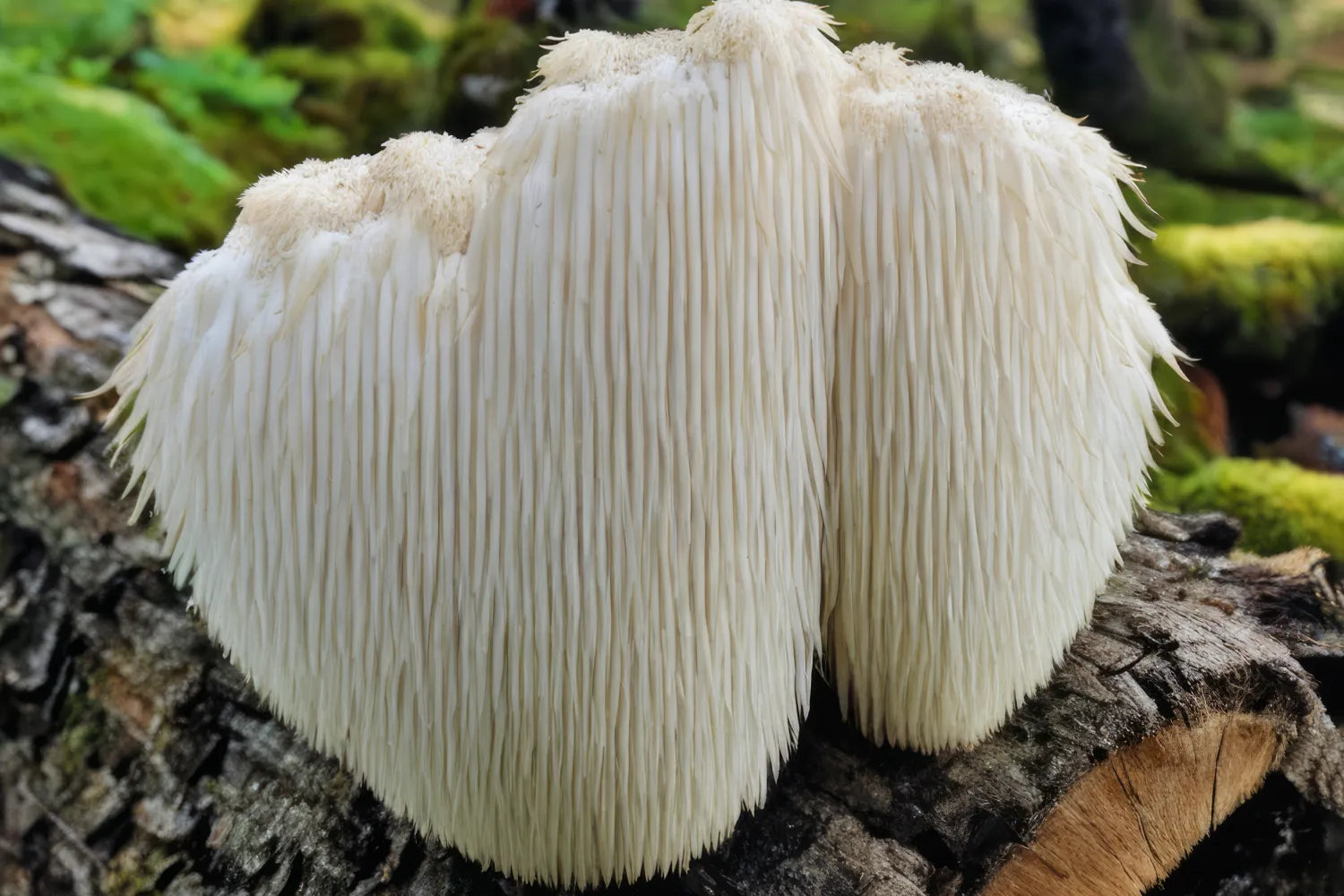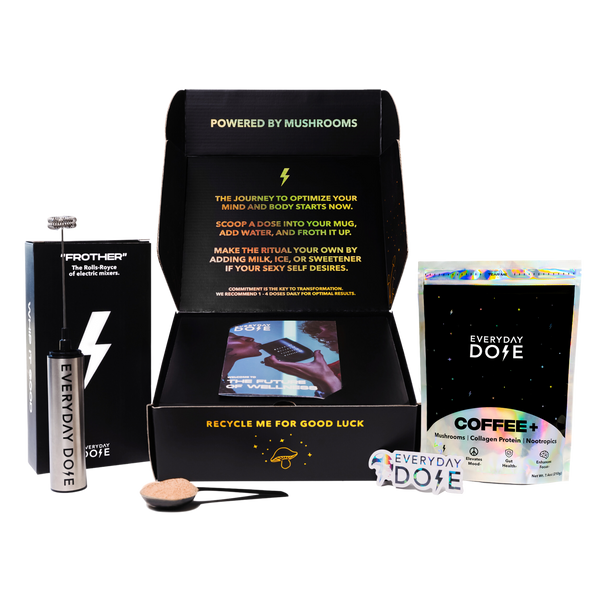Is Lion's Mane a Psychedelic? A Complete Guide

We’ve all heard of magic mushrooms, right? The kind where all you need is a taste, and you’ll embark on a spiritual, rainbow-filled trip through the cosmos?
Magic mushrooms are very real, but not all mushrooms can get you high. For instance, lion’s mane is a popular medicinal mushroom that can support brain health — but is it also psychedelic? Read on to learn more about psychedelic mushrooms and whether lion’s mane is one of them.
First Things First — What Are Psychedelics?
Psychedelics are substances that can make you hallucinate when you take them. Now, we’d like to correct some misconceptions before we move forward.
You might hear the word “psychedelics” and think of kaleidoscopic trips, rainbow colors, and talking trees. While some psychedelics can initiate some pretty intense trips, others are much more mild.
Psychedelics can definitely cause visual hallucinations, but they can also cause you to think in ways you wouldn’t normally think. They can also cause auditory and tactile hallucinations.
Popular psychedelics include:
- Ketamine
- Mescaline
- Psilocybin
- DMT
- LSD
- 2C-B
- NBOMs
These substances are far from new — in fact, Amazonian tribes have used Ayahuasca for untold centuries. This plant contains DMT, one of the most powerful psychedelics. Similarly, Native Americans have taken peyote, a cactus that contains mescaline. In these and other mystical cultures, psychedelics were used to achieve spiritual enlightenment.
What Is Lion’s Mane Mushroom?
Lion’s mane mushroom is a white, fluffy-looking mushroom that grows in North America, Europe, and Asia. It’s been steadily gaining popularity for its many benefits, but like psychedelics, it’s nothing new. In fact, lion’s mane is used in Traditional Chinese Medicine to support mental health and gut health.
The benefits of lion’s mane include the following:
- Supports focus and memory
- Provides prebiotics to support gut health
- Encourages detoxification
- Supports a good night’s sleep
- Encourages balanced mental wellness
- Supports feelings of relaxation
- Provides antioxidants to support long-term wellness.
Is Lion’s Mane a Psychedelic?
Now that we have context for what counts as a psychedelic, it’s time to get to the real reason you’re reading this article. To cut to the chase, no — lion’s mane (Hericium Erinaceus) is not a psychedelic mushroom.
Taking lion’s mane won’t give you hallucinations or visions, and it won’t open up your mind to the secrets of the universe. However, there is some overlap when it comes to benefits.
For instance, one of the main reasons people take lion’s mane is to support focus and encourage clear thinking. It can also help ease feelings of depression and anxiety, similar to psychedelic substances.
Which Mushrooms Are Psychedelic?
We think all mushrooms have a little bit of magic, but only certain mushrooms fall under the title “magic mushrooms.” These are mushrooms that have psychedelic properties, which come from the compounds psilocybin and psilocin. Minor compounds like baeocystin, norbaeocystin, and aeruginascin may also have hallucinogenic effects.
These compounds can show up in quite a few mushrooms. Specifically, you can find them in certain species that are part of the Gymnopilus, Inocybe, Panaeolus, Pholiotina, Pluteus, and Psilocybe genera.
Amanita muscaria is another mushroom that has its own unique psychedelic compounds and may have been used in ancient Hindu ceremonies and practices. Meanwhile, Claviceps purpurea contains a compound that is very similar to LSD, which is a man-made psychedelic.
Are There Benefits of Taking Psychedelic Mushrooms?
With all the hype around psychedelics, you might be wondering if there’s more to these magic mushrooms than simply a good time. As it turns out, there are actually some benefits to taking psychedelic mushrooms. The main thing to consider is that, when taking psilocybin, it’s generally recommended to do so in a safe and relaxing environment with the guidance of a therapist.
Keep in mind that psychedelic mushrooms are currently still illegal to consume in most states. However, more and more research is revealing promising discoveries about their potential. Here are some of the benefits that are currently being researched.
Improves Depression and Anxiety
One study found that taking a single dose of psilocybin, the hallucinogenic compound found in magic mushrooms, helped reduce anxiety in people going through cancer treatment for up to six months. Another study found that two doses of psilocybin combined with specialized psychotherapy could reduce symptoms of depression. For most participants, the effects lasted up to a year, while for others, the effects lasted at least four weeks.
Facilitates Smoking Cessation
If you haven’t been able to kick the habit of smoking, you might soon be able to use shrooms to help you quit for good. One study found that regular dosing of psilocybin alongside behavioral therapy helped participants quit smoking for at least six months — even if they’d failed before.
May Support Sobriety
Smoking isn’t the only substance that psilocybin might help you quit — this crazy compound may also help you quit drinking. One survey of 300 people found that people who had taken any psychedelic drug found it easier to abstain from alcohol. Of course, this research is still in its early stages.
How Can You Take Lion’s Mane Mushroom?
Lion’s mane might not be psychedelic, but we’re pretty psyched about its delic-ious potential. Luckily, you don’t have to make room on your plate in order to enjoy this mushroom — it can be as easy as taking a daily supplement.
Lion’s mane comes in all kinds of forms, including extracts and capsules, so you can find a lion’s mane dosage and format that suits you. Personally, we think the easiest way to take lion’s mane is to simply drink it like a cup of coffee.
Our Mushroom Coffee+ blend combines the cognitive benefits of lion’s mane with immune-supporting chaga, L-theanine to support focus and relaxation, collagen to support gut health, and coffee extract to sweeten the deal with the rich taste of coffee. After just three months, the difference might just blow you away.
The Bottom Line
There are definitely some mushrooms out there that can take you on a crazy trip, but lion’s mane isn’t one of them. That said, lion’s mane can still have incredible benefits for cognitive health and emotional wellness.
At Everyday Dose, we think all mushrooms have a little bit of magic in them. That’s why we’ve incorporated lion’s mane and chaga mushrooms into all of our mushroom blends. Try one for yourself today!
Sources:
Johns Hopkins Center for Psychedelic and Consciousness Research
Cessation and reduction in alcohol consumption and misuse after psychedelic use | SagePub








